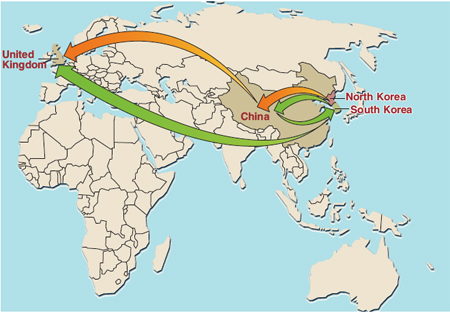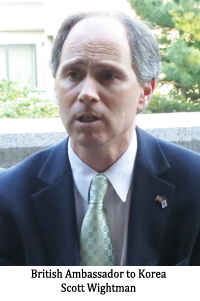NK stays mum on UK refugee policy: envoy
 North Korean refugees and their human rights is a touchy issue which often provokes a stormy reaction from the reclusive Stalinist state whenever South Koreans address it.
North Korean refugees and their human rights is a touchy issue which often provokes a stormy reaction from the reclusive Stalinist state whenever South Koreans address it.
 Yet, according to Ambassador Scott Wightman, the North’s regime has yet to complain about the political refugee policy of the United Kingdom, a popular destination for North Korean asylum seekers.
Yet, according to Ambassador Scott Wightman, the North’s regime has yet to complain about the political refugee policy of the United Kingdom, a popular destination for North Korean asylum seekers.
“Not really. No,” the UK ambassador said last Monday when asked if Pyongyang has ever protested to the British government for allowing legitimate North Korean asylum seekers to live there as refugees.
Wightman said the UK’s popularity as a destination for North Korean refugees is probably due to its reputation.
“There are genuine asylum seekers from the North. That reflects the international reputation that the UK has for taking its international obligations in relation to political refugees seriously,” he said.
“There are also some people that escape from North Korea, come to South Korea and obtain South Korean citizenship. Then they have gone to the UK. Some of them destroy their travel documents and claim political asylum. Those people don’t have legitimate claim to political asylum.”
The ambassador made the remarks during a press meeting with several reporters he invited to his residence in downtown Seoul to mark his first six months in the post.
The UK is home to the largest number of North Korean asylum seekers in Europe.
Some 600 North Koreans are now living there as refugees. Germany, the Netherlands and other European countries also grant asylum to North Korean refugees. An estimated 1,000 North Korean refugees live in Europe.
North Koreans, who leave their homeland to find freedom, often live in fear, haunted by the nightmare of possible repatriation.
They also remain concerned about the safety of their families and relatives left behind in the North, as North Korean leader Kim Jong-un has threatened to kill three generations if any members of a family defect. For this reason, they do not want their names to be released, because if they become known to North Korean officials their relatives will be put in danger.
Some of them chose a country far away from home, such as Britain, to make it difficult for the isolated state’s authorities to find them.
The plight of such refugees who flee to Europe gained public attention after China sent North Korean refugees back to their homeland earlier this year, drawing international condemnation.
North Korea’s continuing silence on the UK’s refugee policy stands in stark contrast to its attitude towards South Korea on the same issue. The North Korean regime has issued strong-worded statements against the South for raising the issue of human rights.
The North considers any protective measures for North Korean defectors as part of a plot to overthrow the regime.
The North Korean human rights bill has yet to be passed in the National Assembly because liberal politicians are opposed to it,
arguing if lawmakers give the green light to the move, it could stir-up the regime.
Strategic priorities
North Korea’s unusually “calm” reaction to the UK’s political refugee policy is seen as a reflection of its diplomatic relations with the European country. The UK government has an embassy in Pyongyang, as does the North in London.
Ambassador Wightman said the UK government has two “small-scale projects” that are going on in Pyongyang.
“We have an English language training program and another small-scale project which helps us to engage with North Koreans. We have critical dialogue in Pyongyang through our embassy there and with the North Korean embassy in London that enables us to explain our concerns about the North Korean nuclear program and about human rights situation,” he said.
“We try to encourage the authorities in the North to adopt policies that will be in the interest of their own people, rather than confrontation with the international community.”
Wightman said North Korea is one of the two “strategic priorities” he has pursued while serving as an envoy here in South Korea. As an ambassador, he noted, the other priority is “maximizing the economic potential” of South Korea-UK relations.
Wightman arrived in Seoul in December last year to assume the new mission shortly after North Korean leader Kim Jong-il died of heart failure.
The abrupt death of the North’s “Dear Leader” kept the UK ambassador busy as he had to provide “intensive analysis” to his government suggesting how the UK should deal with challenges coming from North Korea. <Korea Times/Kang Hyun-kyung>




















































This is a really good read for me, Must admit that you are one of the best
bloggers I ever saw.Thanks for posting this informative article.